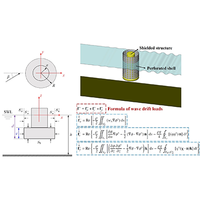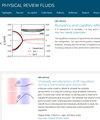Second-order wave drift loads on floating structures with thin perforated shells
IF 2.5
3区 物理与天体物理
Q2 PHYSICS, FLUIDS & PLASMAS
引用次数: 0
Abstract
The computation of the second-order mean wave drift loads on a body with thin perforated shells is fundamental and relevant to a wide range of applications in marine engineering, marine aquaculture, offshore renewable energy, etc. In this work, formulations involving a control surface at a distance from the body are proposed to compute drift loads on structures composed of an impermeable hull and a perforated surface accurately and efficiently. Applications of mathematical identities and conservation of fluid momentum are proved to yield identical formulations. Due to the presence of perforated shells, an integral caused by the dissipation through perforated surfaces is included in the formulation. The present formulation cannot only give all six components of the mean wave drift force and moment, but also determine the drift loads on each individual body of a multibody system. The developed formulations are applied to a series of structures, including single-body and multibody systems. It is found that the perforated surface integral plays a secondary role in the computation of drift loads. Besides, perforating body surfaces can mitigate the near-trapped wave motion in a multibody system. Compared to a fixed system, the mean wave drift loads can be amplified around the resonance frequencies of body motions. The dissipation through the perforated shell can enhance the damping effect and suppress the excessive motion response, resulting in a reduction in the amplified drift loads.

带有薄穿孔外壳的浮动结构上的二阶波漂移载荷
计算薄穿孔壳体上的二阶平均波漂移载荷是一项基础工作,与海洋工程、海水养殖、海上可再生能源等领域的广泛应用息息相关。在这项研究中,提出了涉及与船体保持一定距离的控制面的公式,以准确、高效地计算由不透水船体和穿孔表面组成的结构上的漂移载荷。数学等式和流体动量守恒的应用证明可以得出相同的公式。由于穿孔壳体的存在,公式中包含了穿孔表面耗散引起的积分。本公式不仅给出了平均波漂移力和漂移力矩的所有六个分量,还确定了多体系统中每个单体上的漂移载荷。所开发的公式应用于一系列结构,包括单体和多体系统。结果发现,穿孔表面积分在计算漂移载荷时起次要作用。此外,穿孔体表面可以减轻多体系统中的近捕波运动。与固定系统相比,平均波漂移载荷可在体运动的共振频率附近被放大。通过穿孔壳体的耗散可以增强阻尼效应,抑制过大的运动响应,从而降低放大的漂移载荷。
本文章由计算机程序翻译,如有差异,请以英文原文为准。
求助全文
约1分钟内获得全文
求助全文
来源期刊

Physical Review Fluids
Chemical Engineering-Fluid Flow and Transfer Processes
CiteScore
5.10
自引率
11.10%
发文量
488
期刊介绍:
Physical Review Fluids is APS’s newest online-only journal dedicated to publishing innovative research that will significantly advance the fundamental understanding of fluid dynamics. Physical Review Fluids expands the scope of the APS journals to include additional areas of fluid dynamics research, complements the existing Physical Review collection, and maintains the same quality and reputation that authors and subscribers expect from APS. The journal is published with the endorsement of the APS Division of Fluid Dynamics.
 求助内容:
求助内容: 应助结果提醒方式:
应助结果提醒方式:


